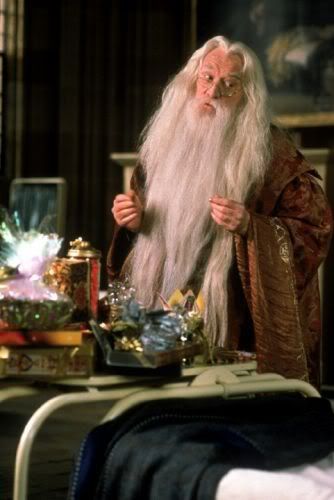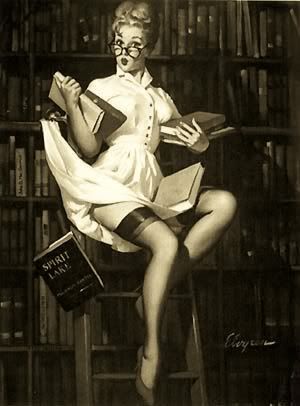 J.K. Rowling revealed that Dumbledore's gay. Hurray! Another reason to email my gal pals and analyze the Harry Potter series yet again. Part of our e-conversation below… please feel free to join the discussion with your comments!
J.K. Rowling revealed that Dumbledore's gay. Hurray! Another reason to email my gal pals and analyze the Harry Potter series yet again. Part of our e-conversation below… please feel free to join the discussion with your comments!* * * * *
Sam: I don't think I was surprised, particularly about the Grindelwald thing. I do, however, think it's sad that none of Rowling's characters seem to be able to get past their first loves and move on. If I let my first unrequited love be the driving force in my life...well, no comment, but it would be a sad life indeed.
The wizarding world seems to be somewhat less forward-thinking, socially, than the more liberal countries of our world. So maybe having gay relationships is Just Not Done, andif Dumbledore wanted to retain his post at Hogwarts, he had to keep his deep, passionate love for Ron's grandfather a secret.But of course, that's not what Rowling said. She said he never got over Grindelwald, and how upset he was when his One True Love turned out to be Wizard Hitler. And since I believe in authorial intent, I have to say that I find this tendency of her characters immature.
Kate: About the first love thing: in terms of our three main characters, it makes sense for them to end up with characters we've met. The romantic readers among us craved such an ending. It would have been a total cop-out if Rowling mentioned in the epilogue that Hermione broke up with Ron and met a lovely man at Wizard Grad School. That's just lame.
And Harry's parents had to have a shared Hogwarts history in order for their son to have plenty of "dead parent moments" at school. It's easier to build a connection between Harry and his parents if they have lots of places and people in common.
Snape and Dumbledore, both transformed eternally by their first love? Doesn't surprise me. After all, by Book Seven they parallel each other in a weird way.
I guess I'm also reassured because I sense back stories for some of the characters. I totally think Sirius was a big fan of loving and leaving the ladies. I wouldn't be surprised if Lupin had a relationship in his past that he thought was scarring but eventually got over. And you just know Trelawney did some kinky hoohah in the name of divination.
But you're right. If Cho Chang is our one example of a wizarding relationship that doesn't work out, that would be pretty darn lame.
Jaime: Also--and I know I've said this before--you have to remember that being a wizard is like being an Orthodox Jew in Memphis. Your community is very small, and dating outside the community it is difficult to meet people and frowned upon, and there are other communities but they're far away. Realistically, Ron and Harry's cohort is pretty small. There are around 70 Gryffindors at any time, so 280 Hogwarts students, and first years don't date seventh years. If you date only one gender, you've got maybe 120 people to choose from. If you refuse to date Slytherins, you're down to 90. So like the orthodox, you date less and marry young.
Also, as to Snape, his whole ridiculous double-crossing life is built upon Lily and makes it super hard to meet girls (all of whom think he's double-crossing.) Quite possibly he now has the hots for Narcissa or Tonks, but really, how could he woo either without betraying his principles? And Snape's a man of principles.
I still think Dumbledore was getting it on with Fawks, if anyone--and I can see how it'd be better to say "I never got over Grindy" than admit the bestial truth.





6 comments:
I must admit, the Dumbledore as a gay man completely slipped by me when reading the books, but I think that is because I have never, ever seen Dumbledore as a sexual being in any way shape or form. Straight or gay. More power to him as a gay man, but I would prefer not to dwell on it, much as I prefer not to dwell on my parents and where I came from. Which is ironic, because I am usually all about the older men. Just not father-figures.
Maren
Fascinating discussion. Very good points made by all.
I think that it's wildly inappropriate for a writer of CHILDREN'S novels to sexualize their adult characters like that: Dumbledore's sex life is NONE of my business, much like my parent's.
My take on it was that, much like Snape's thwarted love for Lily his entire life, Dumbledore's love for the unworthy Grindy shaped his. He became afraid to love romantically. He also knew that the conversative wizarding world would never be tolerant of him, which was one of the reasons he was so tolerant of social outcasts (like werewolves).
I dunno. It seems to me that this is part of his character motivation, just like Snape's romance was for him.
By the end of the books, most readers weren't children anymore but I do agree that I could care less about Dumbledore's sexual orientation. I think Rowling threw that out there more or less to shake up the people who try to have her books banned. Whether it's true or not really doesn't matter.
Maybe this is my grad school indoctrination talking, but I found myself a bit miffed at Rowling's late-in-the-date comments about the books. I don't want to pretend like I'm so passionately "death of the author" focused or anything like that, but she had her chance to tell this story. She had seven chances. And she told a story and it was a great story and that's all there is. So now, whatever her motivations or thoughts were when writing the books, all that exists is the words on the page, not what was/is in her head.
So if I want to think Dumbledore is gay I can do that. And if I want to think he was into bestiality, I can do that too, provided I can back up my claims. But just because Rowling says that this is her vision of Dumbledore doesn't mean we need to accept it, if the text doesn't back it up.
Sorry if this sounds a little preachy. It's not that I'm upset by the idea of Dumbledore as gay/straight/bisexual/whatever. It's more that I don't like this after-the-fact recontextualizing. It smacks of not accomplishing what she wanted to accomplish in the writing and trying to make up for it later. And why is it okay to put this in a press release, but not include it in the books?
Post a Comment